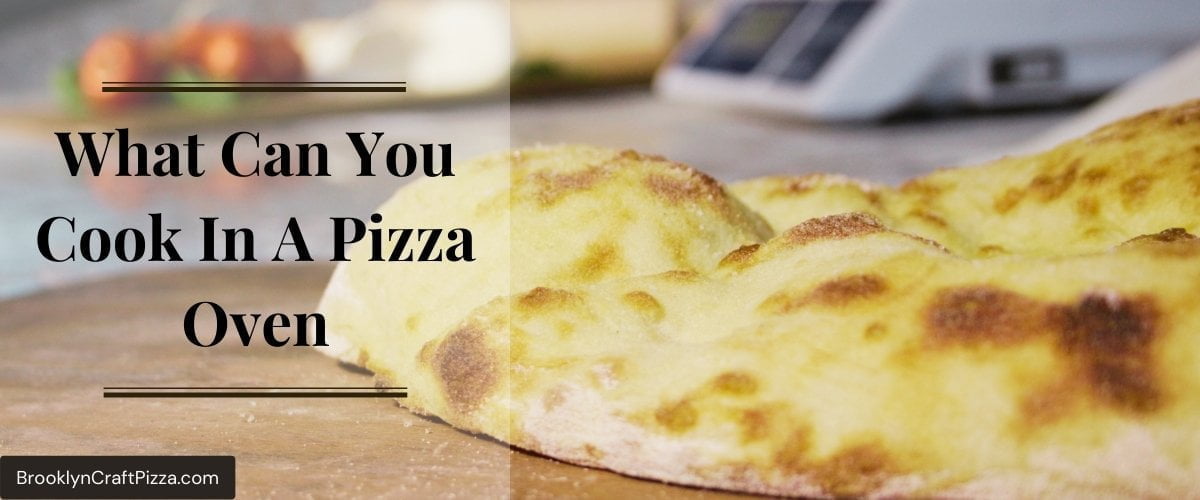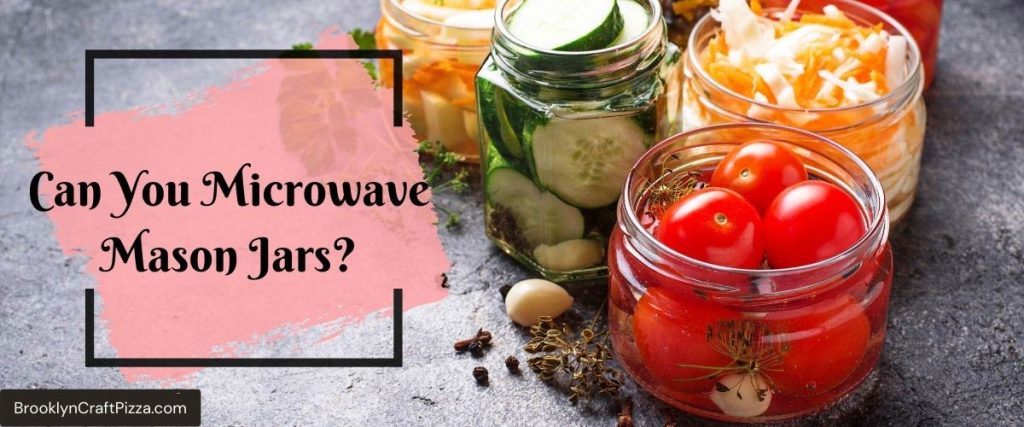
Can You Microwave Mason Jars? Is It Safe?
Mason jars are a staple in homes across America. Mason jars are a popular kitchen item, often used for canning, storage, decor, and more. But what do you do when you need to heat up something in a Mason jar? Can you microwave Mason jars? The answer is Yes, you can microwave Mason jars – with some precautions.
When it comes to microwave ovens, there are a lot of myths and misconceptions out there. Can you really reheat food in a Mason jar in the microwave? And if so, are mason jars microwave safe?
In this blog post, we’ll answer those questions ” Can you microwave mason jars?” and dispel some of the myths about microwaving Mason jars. We will discuss how to safely microwave Mason jars and provide some tips on things to avoid microwaving in Mason jars. Stay safe and enjoy your microwaved Mason jar creations!
Can You Microwave Mason Jars
Are Mason Jars Microwave Safe?
You wonder that Are Mason jars microwave safe or not, the answer is Yes. Mason jars are made of tempered glass, so they are safe to use in the microwave. They can hold soups, stews, cooked fruits or vegetables without having to transfer everything into a separate microwavable container.
However, you should avoid putting metal lids in the microwave (and you probably shouldn’t put them in boiling water either). The inside of the lids may be coated with plastic but it’s hard to say if that coating is completely free from chemicals that could leach out when heated.
Also make sure your mason jar isn’t overfilled with liquid when reheating food contents (because the liquid may spill or splatter when reheated) and never attempt to lift or remove any warmed up jars from the microwave with bare hands – use a towel or hot mitts to lift them out instead.
How To Microwave Mason Jars
So, Can you microwave Mason jars? Are Mason jars microwave safe?
The answer is Yes! Mason jars for microwaves are completely safe to use when heating up food in the microwave oven/microwave-safe dishwasher. If you can heat up your food in the oven/microwave-safe dishwasher, you can heat it up inside a mason jar!
When microwaving food in a mason jar, it’s important to use mason jars for microwaves which are specifically designed to be microwave safe.
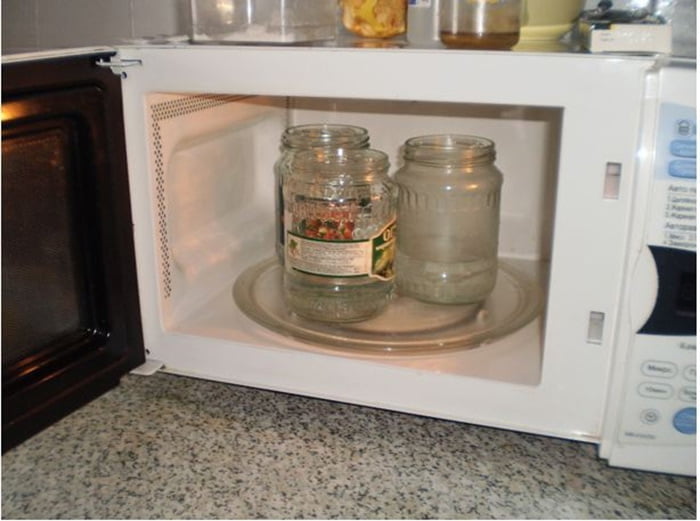
As opposed to regular glass canning jars, mason jars for microwaves have tempered glass lids with sealing gaskets. Regular mason jar lids are either metalized Mylar film on top of the lid or unfinished/uncolored canning jar rims (which aren’t compatible with microwaves).
How To Microwave Food In A Mason Jar Safely
Now you can answer the question “Can you microwave Mason jars?”, but How to do it safely? Follow these simple steps below when microwaving food in a Mason jar, and you’ll be on your way to microwaving delicious meals in no time!
1. Choose A High-Quality Jar
As mentioned above, choose a high-quality thick glass mason jar for best results. Cheap or thin jars may break or crack while being used under high heat. We recommend thicker, more durable jars with stronger lids if you plan on microwaving frequently. That will save you money over the long run by preventing breakage of either the lid or jar itself which can lead to smaller spills during microwaving.
2. Fill Halfway With Food
Fill your mason jar halfway with hot food. Then place the cap loosely on top without screwing it down all of the ways. Do not overfill your jar with hot liquids.
3. Fold A Foil Square And Place It On Top Of The Lid
Fold a square of aluminum foil into quarters, then place it on top of the jar lid like shown below. Then screw the lid on tightly like you normally would without letting go of the foil square. This will allow some steam to escape during microwaving while keeping heat trapped inside at the same time. This is an important step for safely microwaving food in Mason jars!
4. Microwave For 3-7 Minutes
Put your Mason jar in the microwave and set it to cook on high power for three minutes. If your first attempt results in dried-up or burnt spots try again with two minutes instead. The more you microwave your jar of food, the softer or thinner it will become. Use caution when handling hot jars immediately after microwaving. Allow them to cool fully before opening the lid all of the way.
5. Remove Foil And Enjoy
Remove your jar from the microwave and unwrap your foil square carefully so as not to burn yourself with steam or splatter sauce on your hand or oven mitts! If there is still liquid in your jar, screw the lid back on and let sit for a minute or two until it cools enough to touch without burning yourself.
How Long Can You Microwave A Mason Jar?
In general, you can microwave a mason jar for about 1 minute and 15 seconds. However, this may vary depending on the size of the jar and contents inside. Make sure that you do not cook it for too long or it may explode!
If microwaved for too long or at very high temperatures, your mason jars may break due to thermal shock which is a sudden change in temperature. As such, it’s best to follow instructions carefully when using a microwave oven to heat up your mason jars- even more so if you plan on reusing them again!
Pros/Cons of Microwaving Mason Jars
Pros:
1) Inexpensive.
Mason jars can be bought at any hardware store for a few bucks only, compared to the prices of other microwavable containers that cost around $30-50 each. You can use one jar over and over again thus reducing waste!
2) Lightweight.
Mason jars are made from thin glass which makes them lightweight and easy to handle compared to the usual bulky plastic containers you’ll see in most homes today.
As such, they’re great when going on camping or backpacking trips since no additional weight needs to be added to your already overloaded pack!
3) Easy to wash & reuse.
There’s nothing easier than just popping it into your dishwasher but if you want an extra squeaky clean jar, you can always wash it by hand too! They’re very easy to store and reuse again and again.
4) Widely available for purchase.
As stated earlier, mason jars can be bought from hardware stores like Lowe’s & Home Depot at a great price of only a few bucks. You’ll find more options online or even at your local supermarket; they come in different sizes- big or small- and colors too.
Cons:
1) Prone to breakage when handled carelessly during use or washing.
While the glass used in making these are thick enough to withstand moderate microwaving times, they will still break if exposed to thermal shock which is sudden temperature changes.
If microwaved for too long or at very high temperatures, the jar may break due to thermal shock. Stick to microwaving for only a minute and fifteen seconds to avoid breaking your jars!
2) Prone to chipping or cracking if exposed to sudden temperature changes or dropping on its side during use.
As stated earlier, the glass used in mason jars is thick enough but still prone to chipping or cracking especially when exposed to sudden changes in temperature like cold water baths after microwaving them or if dropped accidentally on its side.
To be safe, it’s best not microwave a mason jar containing hot food- simply let it cool first before popping it into the microwave since this can cause any loose chips at the mouth of the jar to chip off and create sharp edges which could potentially cut your lips when you’re trying to eat from it!
As such, you should be extra careful in handling these jars if microwaving them and avoid placing them on their sides when storing them afterward.
3) No lid included.
You don’t get a lid with your mason jar when buying one; this means that you’ll need to purchase the lids separately which can add up when buying dozens of jars at once.
If you plan on using just one or two jars then it’s not an issue but if you want to stock up several dozen jars then it may be cheaper and more convenient for you to buy a canning kit instead which includes all sorts of items like metal screw bands, labels and the jar tongs needed for safely removing jars from the hot water bath.
4) Wide mouth version only available for purchase.
If you’re looking to buy wide-mouth mason jars then your supplier options are quite limited compared to regular or narrow-mouth ones which are readily available even in supermarkets.
You can always check online where you have a wider range of suppliers but if you want it now, it’s best to head on over to the nearest hardware store and see what they have on hand!
5) Requires special lids.
While standard mason jar lids are usually dishwasher safe, the metal screw bands are not so make sure you don’t put them inside your dishwasher or else they’ll rust quickly due to high water temperatures that can be reached inside there.
As such, it’s best to hand-wash these metal screw bands separately from your jar lids.
6) Requires a gadget for sealing & opening.
For those who hate dealing with lids and screw bands then you’re out of luck- because mason jars require them both!
The jar lids are not the same as regular or canning jar lids which means that you can’t use a regular lid on one since they don’t have the rubber lining at the top to create an airtight seal needed for microwave cooking.
So, if you plan on using mason jars in microwavable dishes then make sure they each come with their metal screw bands and lid before buying otherwise you’ll be stuck without replacements when needing to buy extra jars to stock up!
Tips For Microwaving A Mason Jar Safely And Effectively
However, there are a few things to keep in mind when microwaving food inside a mason jar:
1) Remove as much air from the mason jar as possible before microwaving because this will help prevent uneven heating of the contents.
2) To remove as much air as possible from a regular mouth-size mason jar, try layering foods with small amounts (e.g., rice and chicken) instead of one large chunk of food (which might explode if not properly cooked).
Be sure that the lid screws on tightly enough to form an airtight after putting all these layers into the jar. Or you can try cutting the food item in half to allow it to heat more evenly.
3) Ensure that your mason jar lid is microwave safe (e.g., Tattler lids) before microwaving!
Regular metalized Mylar lids (used with regular mason jars for home canning) are not made to withstand the high temperatures of microwaves, so they will melt in a microwave oven which can cause serious damage.
Also, using a regular mason jar lid when microwaving in a dishwasher is not recommended because many dishwashers have high-temperature drying cycles that may warp or melt regular mason jar lids and cause them to stick/explode in your microwave oven later!
4) Be mindful of the jar’s capacity!
To prevent over-heating and cracking, only fill the Mason jar to about 1/2 its volume. If you’re reheating a soup for example, do not put more than 2 cups of broth in the jar.
For best results, use a glass measuring cup to determine how much liquid you should leave in the jar before microwaving it.
5) Use oven mitts or dry towels when handling jars with hot contents.
You can expect that they are going to be very hot, so have protection ready for your hands during removal after microwaving.
Do not touch the outside of the lid as this may also be very hot. Always open lids away from your face to avoid steam burns.
6) Stay in the microwave when heating food in Mason jars.
Even though they are tough, Mason jars can still crack and break. Be safe and don’t leave it unattended. Watch out for lids that may pop open during the process and do not overheat any liquid used to fill up a Mason jar.
7) Always use oven mitts or dry towels to remove jars from the microwave once their contents have been heated- never attempt using bare hands! This will minimize the risk of burns.
8) When microwaving soups, sauces, juices or other watery foods, always allow room for expansion by leaving at least an inch between the top edge of the jar and the contents.
9) If you’re microwaving anything in a jar, always leave at least an inch of space between the top edge of the jar’s contents and the lid- never put lids tightly on jars containing food to be heated.
This will allow steam to escape during heating which may cause seal failure or worse… an explosion!
10) Always open lids away from your face when removing them from microwaved foods.
This is to prevent burns caused by hot steam coming up through the opening upon removal. Another reason why using oven mitts is important!
11) Don’t overheat any liquid used for filling Mason jars before microwaving it since overheating can cause container cracking thus creating unsafe conditions especially if it contains alcohol or other flammable additives.
Some precautions you should take when microwaving mason jars:
- Do not use cheap or old Mason jars.
- Instead of cracking or breaking after repeated uses, the newer and higher-quality glass will stay intact and undamaged through repeated heating and cooling cycles.
- Do not overfill jars with hot liquids. We know it can be tempting to fill your Mason jars full of soup, spaghetti sauce, or even macaroni and cheese. However, we recommend that you do not microwave more than halfway full with hot liquids. This is because the liquid in the jar may overheat and explode out of the jar under high pressure.
- Do not microwave food in a lidless container. If you fill your mason jar with food but leave off the top metal ring and lid, there is nothing for them to latch on to when microwaving. As such, your jar may turn all kinds of fun colors and possibly crack if left standing for too long after microwaving.
Other Things Related To Can You Microwave Mason Jars
What is a Mason Jar?
Before answering the question “Can you microwave Mason jars? Are Mason jars microwave safe?”, let’s find out what a mason jar is.
Mason jars are glass containers typically used for canning food, but also popular for other purposes. Mason jars typically come with a threaded metal cap which forms a tight seal when the jar is closed, trapping in both aroma and freshness.
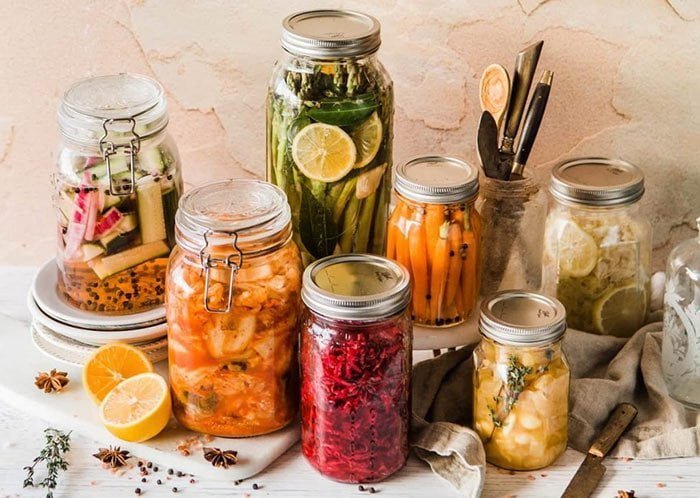
The name ‘Mason jar‘ comes from their association with masons who used the jars to store nails, screws, chalk marks and other supplies readily available at construction sites.
Mason jars can be purchased at many retail locations including Target, Walmart, Walgreens, and even dollar stores. They are often sold in sets of four or six in pint-size (16 oz), quart-size (32 oz), half-gallon size (64 oz). Typically made of tempered glass, Mason jars are known for their durability and resistance to heat extremes.
Some Mason Jar Sizes
Pint-size (16 oz), quart-size (32 oz), half-gallon size (64 oz) jars are common in stores and online. However, there are also other sizes such as:
- 9 oz jelly size (120ml or 4oz)
- 18 oz mini jar (237 ml or 7oz)
- 4 oz baby food size (118ml or 1/2 cup)
- 3.5″ x 8″ tall tapered oval wide-mouth canning jar with handle – 32 ounces
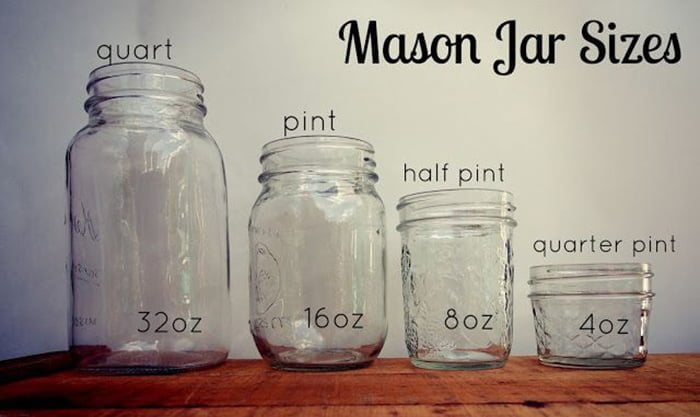
What Makes A Regular Mouth Mason Jar Different From Other Jars?
Regular mouth Mason jars have openings of about 70 mm (2-3/4 inches). Regular mouth lids screw onto this opening.
There are also wide-mouth Mason jars which have openings slightly smaller than regular mouths- about 63 mm across (2-1/2 inches). Wide-mouth Mason jar lids have corresponding screw threading that will mate with the lid opening.
Aside from being able to hold about twice the volume of regular mouth Mason jars, wide-mouth jars are also easier to fill since they allow bigger spoons and ladles. They are also better for stuffing vegetables, fruits or meat with marinades because these bigger jars can fit in items that may not fit into regular mouths.
Why are they so popular?
Mason jars are popular because of their convenience, durability and flexibility. They can be used to store food items such as leftovers, soups, stews or other cooked dishes. They can also be used for dry storage purposes such as storing pasta, rice or sugar.
The high quality glass construction makes them safe for use in both the freezer and microwave ovens without concern about chemicals leaching into food due to long-term contact with plastic or metal lids.
They are great for meal prep – put your lunch salad or sandwich in a jar and you’ll have less mess! Afterward, stick it in the dishwasher so you don’t have to wash it by hand. Save time washing up by putting snacks like crackers, nuts or chips in jars.
There’s no need to transfer your dry goods into plastic bags or Tupperware containers- just put them all in a jar instead! Of course, you can always transfer the contents out of the jars and use plastic baggies for storage if you’d like.
But since it’s made of glass, Mason jars are microwavable so there’s no need to transfer your food into another container before heating it up. After microwaving, simply remove the lid (if microwave safe) and enjoy your meal straight from the jar.
What Can You Put In A Mason Jar?
The uses of mason jars are unlimited since they’re very versatile. Here are just some of the things you can do with them:
• Mix, store and serve cold beverages like cocktails, iced tea, juice mixes and lemonades. They also work great as food storage containers since they keep food fresh longer than most already-opened containers you’ll find in the market today!
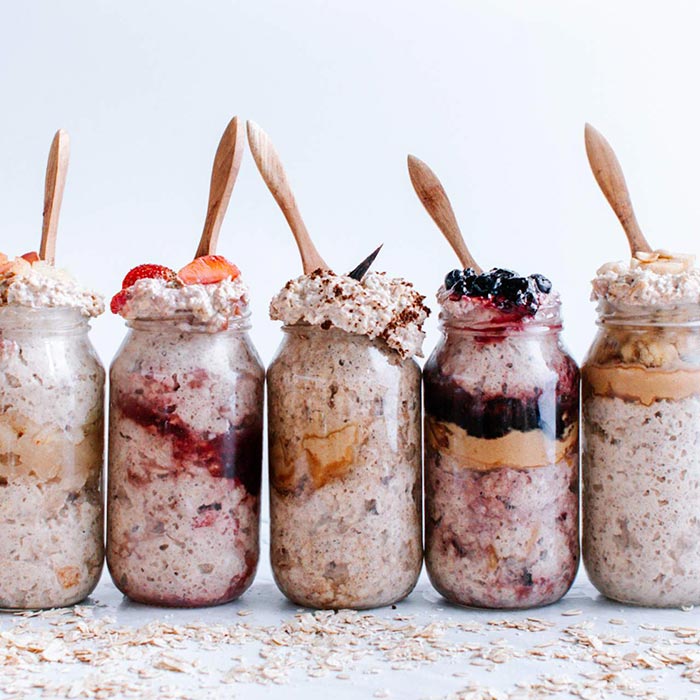
• Store dry foods like breakfast cereal, dried fruits & vegetables, coffee grinds and teas. You can also use it to hold ground meat for burgers too!
• Preserve jams and fruit spreads by sealing it with a flat lid that has an airtight rubber seal. It works for both hot and cold canning.
• Bring your lunch to school or work by packing it in a jar- no need for those wasteful plastic container sets!
• Paint them and use them as vases, planters or candle holders. You can even paint the lids to match your decor if you want!
• Use them in the garden to collect and dispose of pet waste. Simply scoop up the contents in a jar, seal it and throw away when full!
• Make your own cooking mixes like taco seasoning by filling a jar with spices and labels before storing them in the pantry.
• Store homemade cookie & cake dough by freezing individual servings inside jars- simply pop one out when you’re ready to bake!
• Keep your paperclips or thumbtacks organized inside a jar by color or size for easy access. You can even do this with rubber bands too!
Typically, mason jars are used to store food and sometimes drinks. Basically, any food or drink that can go into a regular drinking glass can be placed in a mason jar as well such as pasta sauces, smoothies & soups, peanut butter, pickled vegetables and fruits, salads, desserts like ice cream and chocolate mousse, fresh juices and coffee/tea.
You can also use them as gift containers by placing candy bars and other snacks inside for your loved ones to enjoy! However, keep in mind that some items may require more than one jar so make sure you have enough on-hand.
Mason jar tricks & hacks
✅ Freeze juice in paper towel tubes. When you want to eat them, defrost them one by one in the microwave or on the countertop.
✅ Put threading around your mason jar lid with washer rings to make it easier for you to screw off.
✅ Freeze fresh herbs inside an ice cube tray with olive oil for quick and easy cooking later.
✅ Make green smoothies or green juices in large batches ahead of time so that you can just grab a glass whenever you’re ready for one.
Mason jars are wonderful multipurpose storage containers that are versatile enough for use in most kitchens! Check out Tattler Lids reusable Mason jar lids if you’ve been looking for something airtight and watertight that will not corrode or rust over time.
Sterilizing A Mason Jar In The Microwave
You can also sterilize a mason jar in the microwave. This process is only effective when using a regular mouth (smaller) sized jar and lid:
1) Ensure that your jar and lid are clean from any previous use or residue then rinse them thoroughly with warm soapy water.
2) Place dry, clean items into the microwave on a microwavable safe dish and cover it with a wet paper towel to prevent splattering of food particles while cooking.
Alternatively, you could add some water at the bottom of your dish to create steam which will further help sterilize your mason jar during microwaving. Just remember not to place the metal lids in there!
3) Microwave for 2-3 minutes or until boiling hot.
4) Let the jar and lid sit in there for a couple of minutes to cool down or else they’ll be too hot to work with right away. But if you feel that they’re not sterilized enough then repeat steps 2-3 until you feel satisfied.
How Do You Clean Mason Jars?
Cleaning mason jars is not complicated! Here are some simple steps:
1) Wash by hand using warm soapy water and/or scrub using a dish sponge then rinse completely under running tap water
2) For stubborn stains, place your jar in a small pot of boiling water for about ten minutes
3) To sterilize, place your mason jars inside a pressure cooker for 15-20 minutes at 5 lbs. of pressure
4) When cleaning lids, remove excess glue residue by rubbing it with acetone or alcohol then wipe down with an old rag.
How to Determine Whether or Not The Mason Jar is Compatible With Microwave?
If you’re wondering whether or not mason jars are compatible with microwaves then the answer is yes!
A mason jar is compatible with the microwave if it is labeled as “microwave safe” or “heat-resistant” or has a wide mouth opening. Otherwise, you can check if its lid is designed to be used in the microwave by checking for “microwave safe” on the lid, checking if it’s made of plastic, and/or checking for steam vents on the lid.
If there is no indication on the label then that means that it is not intended to be used in microwaves.
However, while most lids are microwave safe some manufacturers may have different opinions so if you’re not sure about it then better check with the manufacturer first.If you’re looking to use your jar in a dish that requires cooking then just follow our guide above for how to do it safely.
How To Identify Authentic Mason Jars?
If you’re wondering how to identify authentic mason jars then just follow our simple guide:
1) Check for misspellings and grammatical errors in the label and/or logo design. Make sure all words are spelled correctly. If there’s a mistake then that means it’s not an original which may indicate that it wasn’t made by Ball or Kerr Glass Manufacturing Company.
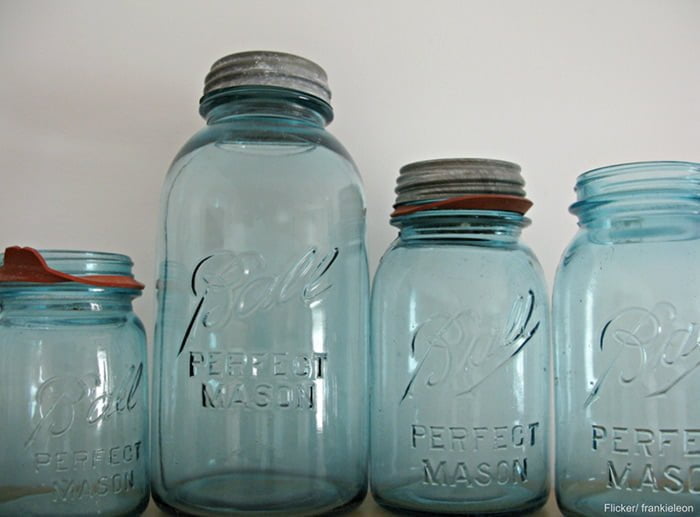
2) Check for bumps or bubbles in the glass.
3) If you have access to a jeweler’s loupe or magnifying glass then check if there are any small air bubbles in the jar to indicate that it was made by hand. This is one of the best ways to spot an authentic mason jar.
Keep in mind that machine-made jars will not have this so they’re easy to distinguish from handmade ones.
4) Make sure that your jar features sharp, distinctive angles and corners instead of rounded edges which may mean that it wasn’t made using traditional methods and machines.
5) Remeasure your jar just to be on the safe side since some counterfeiters try to use jars with very similar sizes as those used by Ball or Kerr.
Are Mason Jars Recyclable?
Yes, they are!

Mason jars can be recycled as long as the lid is removed and it has not been used to hold chemicals. Also, make sure that you remove excess labels and residue before recycling your jar so those things don’t contaminate other recyclable materials.
Mason jars are recyclable in some areas, but not in all. Check to see if your local recycling facilities accept glass jars before throwing yours out or else you’ll be doing the environment a huge disservice!
FAQs on Can You Microwave Mason Jars
Can you microwave glass jars?
Just make sure that you follow our guide above for how to do it safely when using it in cooking dishes that require longer periods of heating like stews, casseroles, soups, pasta sauces with meat, etc.
How can you use them in your kitchen?
What is best way to store food in mason jars?
Leftover soups & stews are also good choices so you don’t have to deal with tupperware containers when microwaving them later. Just heat the soup or stew in a bowl first then transfer it to a mason jar so you can take it with you.
Another great food for storing in a mason jar is yogurt. Yogurt will last about 2 weeks when stored properly inside one of these jars.
You can also add fresh fruit, honey or jam into the bottom of the jar before adding the yogurt for extra flavor and vitamins that won’t end up getting watered down once reintroduced to your body after digestion!
What can you microwave in a mason jar?
How to open a mason jar – the quick way
Place the closed jar in boiling hot water for 10 minutes. This should help soften up any stuck-on residue on the rim of the jars so you can successfully twist off stuck-on caps.
Can you put a mason jar in the dishwasher?
After washing, make sure all parts are dry before removing the plastic seal ring from inside. The ring will expand once wet and if left on during storage, mold might grow over time. Enjoy!
How to wash mason jars and lids in dishwasher safe?
You can also hand wash them if you don’t want to risk sending them through the dishwasher because it could warp their shape over time (especially the metal rings).
How to clean lids and rings?
Mason jar lids are NOT dishwasher safe so it’s best to hand wash or soak without any detergent instead of risking damage from the high heat inside the dishwasher.
Can you use the lid that comes with mason jars to microwave it?
How do you remove a lid from a microwaved jar?
How long do mason jars last?
– Keep lids and rings clean by hand washing after use (don’t send through dishwasher). Dry parts thoroughly before storing to reduce corrosion which can cause rusting or paint flaking over time.
– Do not stack jars while wet to avoid warping the glass and labels. Allow drying time before stacking, especially if your jar has a logo or pattern on it.
– Remove part of the label where the lid will touch (the heat from processing might cause ink flaking) and store in a cool, dark place out of direct sunlight.
– Don’t use for hot food storage until after washing with dish soap and don’t microwave.
– Keep away from sharp objects that could chip the glass or scratch the finish.
Final Verdict
Microwave-safe mason jars are a great way to reheat food or drink. They’re perfect for college students, people on the go, and busy families who want to have that same home-cooked meal every night of the week.
However, Glass may break if heated too high or for an extended period of time, which could lead to severe injuries and/or property damage. If you’re looking for a microwave-safe option, try using ceramic containers instead.
So, Can you microwave Mason jars? and Are Mason jars microwave safe?
You can microwave Mason jars, but it is not recommended. Microwaving a jar will cause the glass to expand and contract rapidly which could lead to spontaneous breakage and possible injury if you were holding the jar at the time.
There are other ways of heating up food in mason jars that do not involve microwaves such as using boiling water or placing them on top of a stove for 15 minutes until they reach 165 degrees Fahrenheit before removing from heat.
I hope this article helped answer any questions about whether or not you can safely heat up food in Mason jars! Let me know what you thought in the comments below!
If you have any questions about this topic please contact our customer service team.
Further reading
Can You Microwave Almond Milk?
How To Make Oatmeal In The Microwave?



